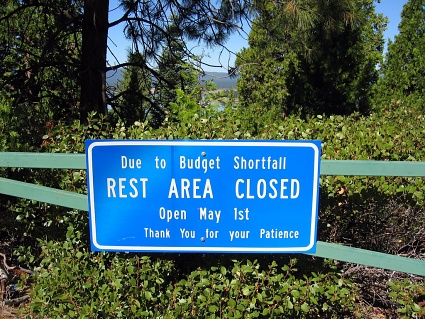Any serious detourist knows it's crucial to take frequent breaks when covering long distances. Even if it's just 5 minutes to stretch your legs and grab a sack of peanut M&Ms from a caged snack machine, a pit stop helps avoid fatigue and possible accidents on the road.
Unfortunately, recent reports indicate that several states are shutting down many of their highway rest areas. According to The Wall Street Journal, departments of transportation are beginning to see their rest stops as obsolete and have begun barricading exits.
Louisiana has closed 24 of its 34 rest areas since 2000, four of them last year. Maine, Vermont and Colorado have recently announced plans to shutter more rest areas because of cash constraints. Rhode Island, Tennessee, Arizona and others are thinking of doing likewise.
Many people see highway rest areas as places to avoid. A majority are old, smelly and, frankly, a little frightening. In recent years, however, some states have been upgrading their facilities into cleaner, more stylish accommodations. In 2002, for example, Texas began opening brand new safety rest areas like the one pictured here outside Pampa, an art deco number designed with a Route 66 theme. The new stations feature better lighting, 24-hour maintenance, hot water, soap, air conditioning, wifi access and, in some cases, a police outpost. Iowa has recently begun doing the same, even including a gift shop offering local wares.
Other states, unfortunately, see rest areas as a place to save some cash. Virginia, which is moving the most aggressively according to the WSJ, says it can save $9 million a year by closing 19 rest areas.
In some regions, closures may seem logical with the number of gas stations and convenience stores popping up along the highway, but unfortunately, the bathrooms of too many such businesses are no cleaner, and in many cases, are far worse than state facilities. And if the person behind the counter is steadfast in his "restrooms for customers only" policy, you've got to drop some cash just relieve yourself. What's more, proprietors usually aren't too keen on people taking quick naps in the parking lot, something for which public rest areas are often an absolute necessity.




